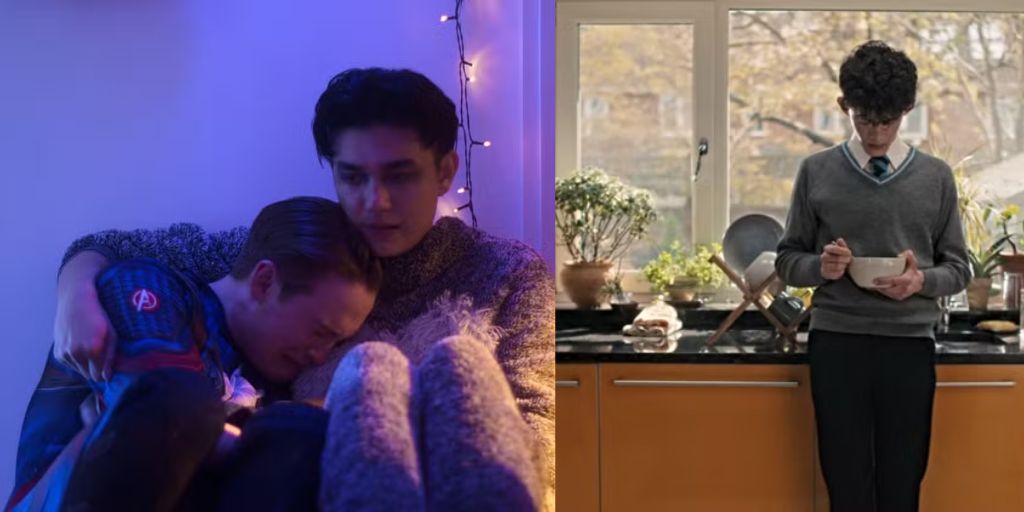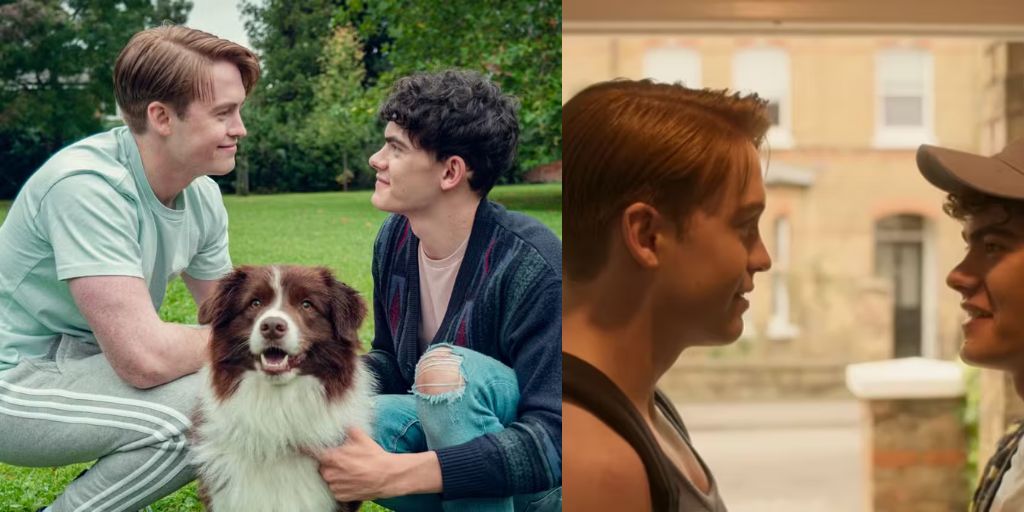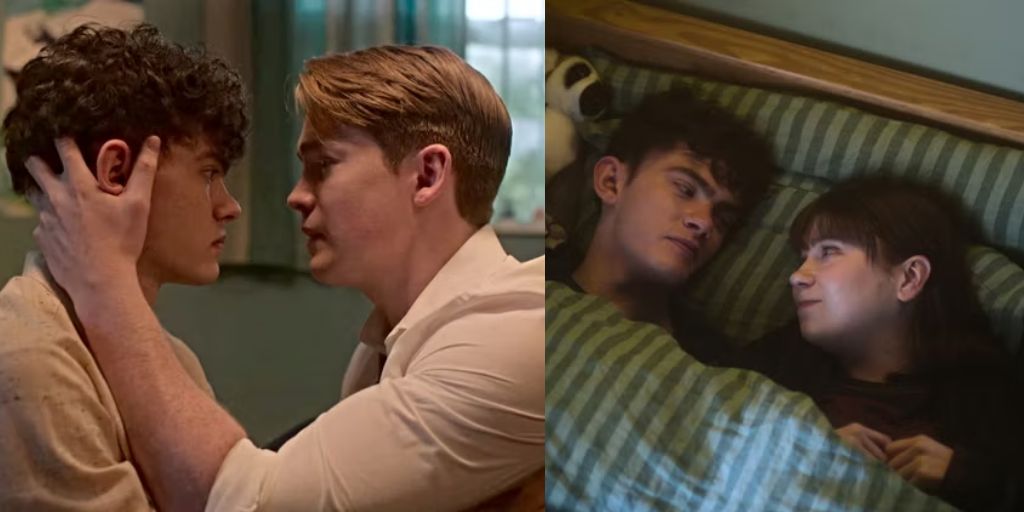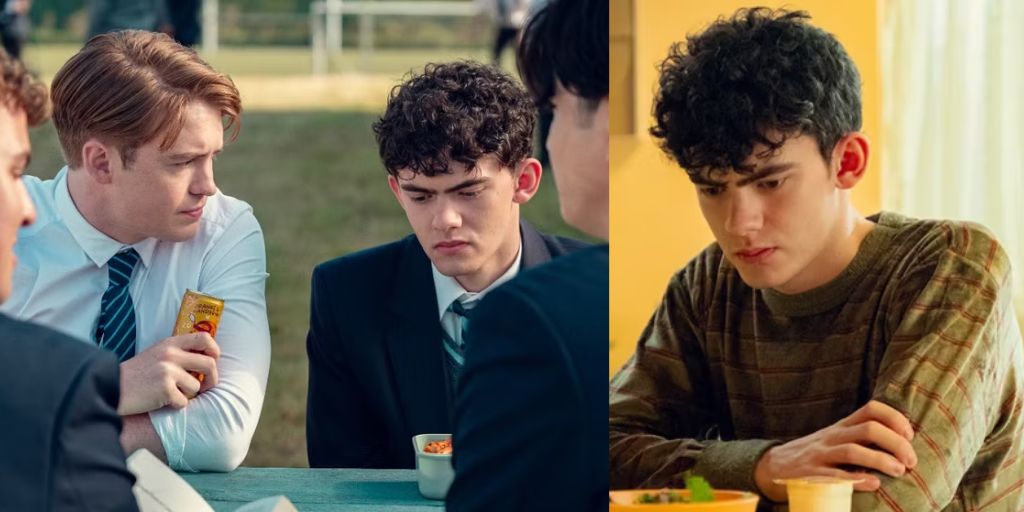Throughout Heartstopper’s previous seasons, we’ve seen the series tackle a range of emotional and serious issues, from the struggles of coming out to dealing with emotionally abusive relationships. Though much of the show feels light and fun, filled with youthful energy, it never shies away from heavier subjects.
The first two seasons have successfully balanced moments of joy and heartache, capturing the spirit of being a teenager with its simple doodles, bright colors, and occasional confusion.
However, in Season 3, the show grows even more serious, with a stronger focus on mental health, especially Charlie’s (played by Joe Locke) mental well-being. This shift is more prominent than ever, particularly in Episode 4, which brings mental health issues to the forefront in a way we’ve never seen before.
It’s no surprise that Heartstopper’s third season earned a 100% Rotten Tomatoes score, just like the first season did. The powerful themes, moving performances, and deeper emotional narratives have resonated with audiences worldwide.
Out of all the episodes, Episode 4, titled “Journey,” stands out the most. This episode shows mental health and eating disorders in a very real, impactful way. It’s a significant moment not only for the show but also for the broader discussion of mental health and representation. Without a doubt, it’s the most powerful episode of Heartstopper so far.
What Happens in “Heartstopper” Season 3 Episode 4?
The third season of Heartstopper picks up on a story that started in Season 2. In the previous season, we saw hints of Charlie struggling with food and eating habits. While Season 2 introduced this issue, Season 3 goes into much more detail, with Episode 4 focusing deeply on how these struggles affect both Charlie and those around him.
By this point in the show, Nick (played by Kit Connor) has finally gathered the courage to talk to Charlie about his eating problems. Nick knows it’s a sensitive topic, but he can’t ignore it any longer. He wants to help Charlie, and he encourages him to have an open conversation with his parents about what’s going on.
The episode is cleverly divided into two parts. First, we see things from Nick’s perspective, and then we switch to Charlie’s. This allows us to understand how both characters are feeling and how the issue affects them differently. After seeing a doctor, Charlie is officially diagnosed with an eating disorder.
The doctor’s confirmation pushes Charlie to make a big decision—he decides to check into an inpatient facility to get treatment. Charlie isn’t very hopeful that the treatment will work, but he feels like it’s a necessary step to take.
One of the strengths of Heartstopper is its ability to show how mental health struggles affect not only the person going through them but also their loved ones. Episode 4 does a great job of portraying how Nick feels about Charlie’s eating disorder and how helpless he sometimes feels.

The script leaves room for quiet moments—long silences that highlight the emotional pain both characters are going through. There are even moments of lightheartedness between friends, but these jokes only make the empty spaces feel even more painful.
The episode doesn’t take a heavy-handed or insensitive approach; instead, it tells the story with simplicity and honesty. This straightforwardness is reflected in Charlie’s attitude toward his own experience—he sees the situation for what it is and faces it directly, even though it’s difficult.
Heartstopper also provides valuable information about eating disorders and mental health, woven into Charlie’s storyline. His recovery isn’t shown as a straight path. He has moments of progress where he starts to eat better, but there are also times when he falls back into old habits.
As the saying goes, things often get worse before they get better, and that’s certainly true for Charlie. He lashes out at Nick, his friends, and his parents. He isolates himself, giving in to his compulsions. However, he also has good days, days when he’s able to push forward and try to get better.
The show also touches on the fact that inpatient treatment facilities aren’t always helpful for everyone and that not everyone has access to them. By doing this, Heartstopper avoids making the recovery process seem too perfect or easy.
Joe Locke’s Performance Steals the Show in ‘Heartstopper’ Season 3
While the storyline in Episode 4 is incredibly powerful, much of its emotional impact comes from Joe Locke’s performance as Charlie. Locke gives one of his most heart-wrenching performances in this episode, bringing Charlie’s inner turmoil to life in a way that feels raw and genuine.
He doesn’t shy away from showing the difficult emotions that come with Charlie’s struggle. Instead, Locke embraces these moments, allowing the audience to feel Charlie’s pain, frustration, and exhaustion.
There’s one particular scene where Charlie is overwhelmed by his compulsions, and Nick’s attempts to comfort him start feeling more like nagging. In this moment, Charlie pulls away from Nick, unable to cope with both his inner struggles and the concern from those around him.
Locke portrays Charlie’s isolation with incredible depth. We can see the weariness in his eyes, the gauntness in his face, and the way he seems almost trapped inside his own mind. His body language says it all—he’s slouched, withdrawn, and completely drained from fighting against his own thoughts and feelings every day.
Even during the lighter moments in the episode, there’s always a sense that something darker is looming in the background. Charlie may smile or laugh, but Locke’s subtle acting shows us that there’s still sadness and hopelessness underneath the surface.
During the montage of Charlie’s stay at the facility, we hear his grave narration. His voice moves between sadness and faint hope, reminding us that his journey toward healing is far from easy. When Charlie’s recovery takes a more positive turn, it’s fragile, as though each step forward could fall apart at any moment.
His hidden kiss with Nick is a brief moment of victory, where Charlie reclaims a little bit of happiness. Locke perfectly captures every emotion, making Charlie’s experience feel both real and deeply moving.
Nick’s Emotional Journey in Episode 4
What makes Episode 4 even more significant is that it doesn’t just focus on Charlie’s experience—it also shows how Nick is affected by everything that’s happening. Often, when we talk about mental health, we focus on the person who’s struggling and forget about the impact on their loved ones.

However, Heartstopper acknowledges that mental health issues ripple through the entire support system, affecting everyone involved. In this case, we see how Charlie’s eating disorder deeply impacts Nick.
One of the most memorable moments from this episode is a conversation between Nick and his aunt, who is a psychiatrist. Fans of Alice Oseman’s original Heartstopper novels have been eagerly waiting for this moment. Nick confides in his aunt, sharing how he feels about Charlie’s health and how helpless he sometimes feels.
His aunt responds with a line that is both powerful and heartbreaking: “love can’t cure a mental illness.” It’s a reminder that while love and support are important, they aren’t enough to solve everything. This moment also helps Nick realize that he can’t take full responsibility for Charlie’s recovery.
Kit Connor, who plays Nick, gives an emotional performance that allows us to feel Nick’s pain and frustration. After talking to his aunt, Nick tries to approach Charlie’s situation with patience and understanding. However, it’s clear that he’s struggling too.
Connor’s body language and facial expressions reveal just how much tension and stress Nick is carrying. He’s constantly on the edge, trying to hold everything together for Charlie while also dealing with his own emotions.
One of the most powerful scenes comes during the Halloween party. As the night goes on, Nick becomes more and more overwhelmed. The lights and movement around him blur, creating a dizzying effect that mirrors how disconnected Nick feels from everything happening around him.
At the center of all the chaos is Nick, trying to stay calm but clearly struggling. Eventually, Nick can’t take it anymore, and he breaks down in Tao’s (played by William Gao) arms. This moment is a turning point for Nick, as he finally lets himself feel the weight of everything he’s been going through.
Why “Heartstopper” Season 3 Is So Important
Eating disorders are rarely represented in media, and when they are, they are often shown in a very limited or stereotypical way. Too often, these portrayals either romanticize the illness or reduce it to a single cause, like body image. Heartstopper takes a much more nuanced approach, especially in how it addresses eating disorders in young men, a group that is often overlooked when it comes to discussions about eating disorders.
Charlie’s storyline is incredibly important because it sheds light on an issue that many people don’t talk about. In the show, Charlie is diagnosed with anorexia nervosa and OCD (obsessive-compulsive disorder).
His eating disorder isn’t just about body image; it’s tied to his compulsions and the belief that if he doesn’t follow a strict eating routine, something terrible will happen. This is a refreshing and necessary portrayal of how eating disorders can manifest in different ways, beyond the typical stereotypes.
But what makes Heartstopper even more impactful is how it shows the effect of Charlie’s illness on the people around him. It’s not just Charlie who suffers—Nick, Tao, and even Charlie’s sister, Tori, feel the weight of his struggle.
In earlier seasons, we saw how Tori supported Charlie, but her pain and concern often went unnoticed. In Episode 4, we see this dynamic play out again, but this time, the dual perspectives of Charlie and Nick bring a new layer to the story.

The episode encourages open conversations about mental health, not just for those who are struggling but for their loved ones as well. It sends a message that everyone involved needs support.
Through two standout performances from Joe Locke and Kit Connor, Heartstopper creates a delicate balance between difficult subject matter and a sense of hope.
Even in the darkest moments, the show reminds us that there is always a possibility for things to get better, even if the path isn’t straightforward. It’s a powerful message that resonates with viewers and opens up conversations about mental health, eating disorders, and the importance of support systems.




